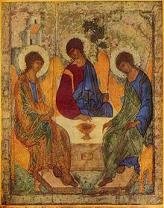 I ended this article in the last issue of the Eastern Herald, by sharing John Damascene’s definition of the two terms which have repeatedly showed up in this article, namely ousia and hypostasis. Hopefully my readers are beginning to have some sense of the meaning of these words. I will repeat what John said: ousia is a thing that exists by itself, and which has need of nothing else for its consistency. Again, ousia is all that subsists by itself and which has not its being in another. It is thus that which is not for another, that which does not have its existence in another, that which has no need of another for its consistency.
I ended this article in the last issue of the Eastern Herald, by sharing John Damascene’s definition of the two terms which have repeatedly showed up in this article, namely ousia and hypostasis. Hopefully my readers are beginning to have some sense of the meaning of these words. I will repeat what John said: ousia is a thing that exists by itself, and which has need of nothing else for its consistency. Again, ousia is all that subsists by itself and which has not its being in another. It is thus that which is not for another, that which does not have its existence in another, that which has no need of another for its consistency.
But is in itself and in which the accident has its existence. The term hypostasis has two meanings. Sometimes it means simply existence. For this definition it follows that ousia and hypostasis are the same thing. Hence certain of the holy fathers have said: natures or hypostases. Sometimes it denotes that which exists by itself and in its own consistency; from which meaning it comes that it denotes the individual, differing numerically from every other. The two terms would thus appear to be more or less synonymous; ousia meaning an individual substance, while being capable at the same time of denoting the essence common to many individuals; hypostasis, on the other hand, meaning existence in general, but capable also of application to individual substances. According to the testimony of Theodoret of Cyrus: ‘for profane wisdom there is no difference between ousia and hypostasis. For ousia means that which is, and hypostasis that which subsists. But according to the teaching of the fathers, there is between ousia and hypostasis the same difference as between common and particular. The genius of the Fathers made use of the two synonyms to distinguish in God that which is common – ousia, substance or essence – from that which is particular – hypostasis or person.
I suspect that by now many of my readers might be thoroughly confused. The Fathers had to maintain that the True God had one common substance between the three Persons and that the Three Persons were uniquely separate and distinct. Thus they used words that could be applied to offer this distinction but, at the same time, since they were synonyms, always expressed the fact that Three Persons were only ONE GOD. It is a mystery but a wonderful mystery which our Holy Fathers found a way to express in profound terms.
